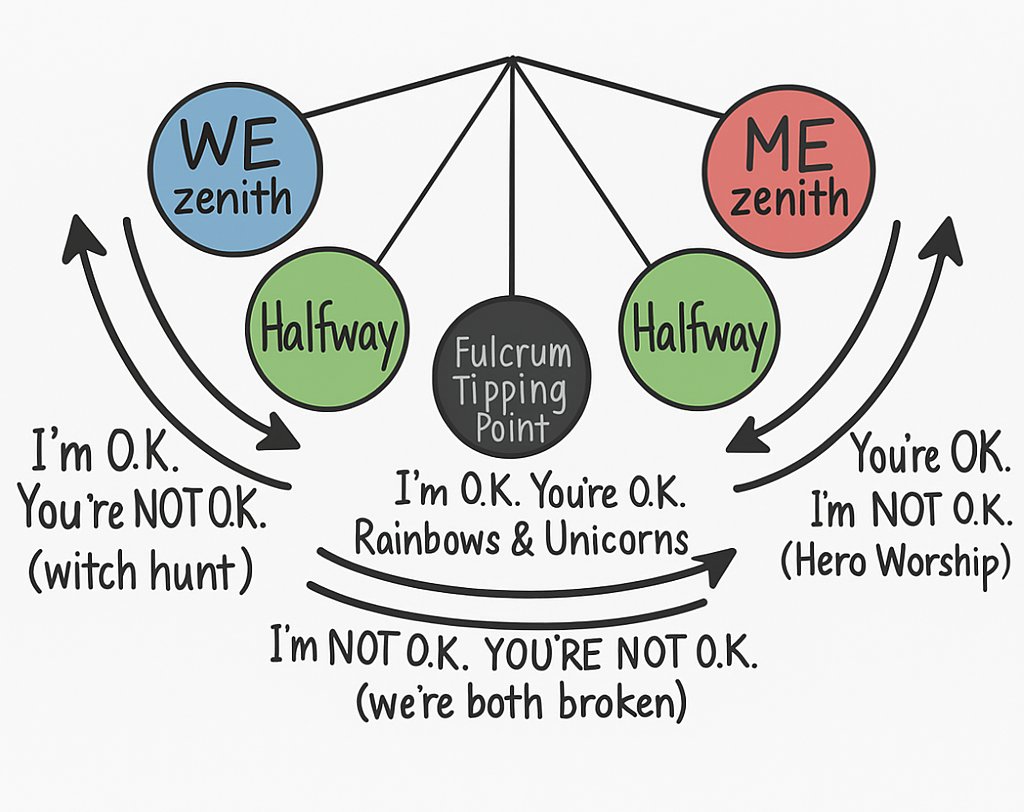Five Things We Will Learn
- Why every “We Generation” throughout history eventually reaches a breaking point.
- How moral certainty, tribal division, and collective control emerge at the peak of unity movements.
- The repeating 80-year rhythm of crisis—from revolutions to civil wars—that follows each cultural peak.
- Why our current season (2023–2025) mirrors these historic tipping points.
- How smaller gatherings of believers and relational discipleship are God’s timeless remedy when the world fractures.
The Moral Tension of a “We” Generation
Yes — you’re exactly right to notice that pattern.
According to Roy H. Williams’ Pendulum Theory, each time culture reaches the peak of a “We Generation,” society becomes so morally charged and collectively certain of its cause that conflict becomes almost inevitable.
It’s not prophecy in the biblical sense — it’s pattern recognition drawn from 3,000 years of cultural history.
But the record is sobering.
⚖️ What Happens at a “We” Peak
When the pendulum reaches the top of a We Generation, three things typically converge:
- Moral Certainty — People are convinced their side holds the moral high ground.
- Tribal Division — Society splits into “the righteous” and “the wicked.”
- Collective Extremism — Passion for unity turns into pressure to conform — and eventually, coercion.
Williams notes that the very virtue of the We Generation — responsibility — becomes distorted into control.
The drive to do what’s “right for everyone” hardens into “you must believe as we do.”
This is when collective zeal stops uniting and starts dividing.
When unity becomes uniformity, and conscience becomes control.
🕰️ Historical Parallels
History shows that nearly every time the pendulum reaches a “We” peak, widespread conflict follows.
| We Generation Peak | Approx. Year | Major Division or Conflict |
| 1620s | Early Puritan We | Religious wars in Europe (Thirty Years’ War, 1618–1648) |
| 1780s | Revolutionary We | American Revolution and French Revolution |
| 1860s | Moral Reform We | U.S. Civil War (1861–1865) |
| 1940s | Global Unity We | World War II (1939–1945) |
| 2020s | Identity & Moral Activism We | Cultural polarization and ideological conflict (still unfolding) |
Each of those We peaks produced massive upheaval: people unified so strongly around competing moral visions that nations split apart.
🔥 Where We Are Now (2025)
We’re living at that same tension point.
Western culture—especially in America—has reached the height of moral and ideological polarization. Each side sees itself as defending virtue and truth. That’s classic We-peak behavior.
If history holds, this intensity will continue for several years before giving way to exhaustion—and eventually, renewal—as the pendulum begins its slow swing back toward Me (individual freedom, creativity, and personal responsibility).
So while a civil war in the traditional, 1860s sense isn’t predetermined, civil fragmentation—deep cultural, moral, and possibly physical division—is exactly what tends to surface at these peaks.
Williams calls this period the “Crisis of the We.”
🕊️ The Hope in the Pattern
The good news is: every collapse of a We leads to a renewal of freedom and authenticity.
After every war or cultural breakdown, the pendulum swings back toward rebuilding, creativity, and personal faith.
That’s why what the Lord is emphasizing through smaller gatherings—family-sized churches, genuine discipleship, and believers connecting again in homes and relationships—is not only biblically grounded, it’s historically timed. Check out Vine Fellowship Network as we’re walking this very expression out.
At the top of every We, the structures of power strain and fracture.
But God always raises up a remnant who rebuild His house from relationship, not religion.
In these moments, revival doesn’t come from stages or stadiums—it begins around tables, in living rooms, and among those who humbly love one another as family.
When the world fractures, God gathers.
When institutions crumble, Jesus restores His Church in homes again.
History’s pendulum may swing, but His Kingdom remains unshaken.




